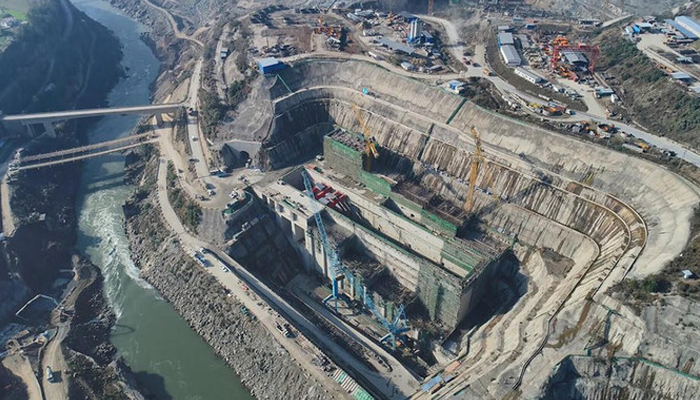Controversial hydroelectric projects: ‘India playing victim card despite being beneficiary of resolution mechanism’
Pakistan has said India’s efforts to harness hydroelectricity at Kishenganga and Ratle will violate Indus Waters Treaty
LAHORE: Despite being a beneficiary of long-drawn-out dispute resolution mechanism led by the World Bank, India is playing victim over the controversial water infrastructure projects it is illegally building in IIOJ&K.
Last week, India boycotted the proceedings of Court of Arbitration and instead participated in two-day meeting of the Neutral Expert in Vienna on the same issue of 330MW Kishenganga and 850MW Ratle hydroelectric project dispute with Pakistan. The meeting was held on September 20-21, 2023.
Commenting on the development, an official of Pakistan’s Permanent Indus Commission said India benefited from delay of over five years by the indecisive World Bank over the issue. He added India is playing victim by avoiding participation in proceedings of Court of Arbitration set up over the controversial water infrastructure projects being built on western rivers in the held Kashmir.
Pakistan has said that India’s efforts to harness hydroelectricity at Kishenganga and Ratle will violate the Indus Waters Treaty. The official recalled that the dispute resolution mechanism abruptly held in abeyance after invoking an unprecedented pause of over five-year in fact directly benefited India by virtually allowing it to carry out work on controversial projects.
On December 12, 2016, the World Bank stopped initiation of separate processes under the Indus Waters Treaty in what the bank called a step to allow the two countries to consider alternative ways to resolve their disagreements.
However, World Bank totally ignored the fact that Pakistan, being lower riparian, raised objections over the construction of Ratle and Kishenganga hydropower projects on Chenab and Jhelum rivers respectively, upstream infrastructure being built by India in the held Kashmir.
When Pakistan formally asked the World Bank to establish a Court of Arbitration over the dispute, India astonishingly submitted the demand to appoint Neutral Expert for the same. The Indian move was only aimed at derailing dispute resolution process set out under the 1960 Indus Waters Treaty.
The World Bank announced in late December 2016 ‘temporarily’ halting the appointment of Chairman of the Court of Arbitration, as requested by Pakistan, and Neutral Expert, as requested by India, to resolve issues regarding two hydroelectric power plants under construction by India along the western arm of Indus rivers system.
The World Bank gave logic at that time that both processes initiated by the respective countries were advancing at the same time, creating a risk of contradictory outcomes that could potentially endanger the Treaty. However, the World Bank was wrong here too as both countries did not initiate these processes but asked the bank for launching them. This pause lingered till April 06, 2022 under the watch of World Bank, giving India ample time to initiate work on 850 MW Ratle Hydropower Project after completing all requirements for its construction. It means if Pakistan’s objections are held lawful over the design of disputed hydropower projects, these could not be adjusted by rendering them as wasteful attempt after completion of the water reservoir. The Ratle Hydropower Project is scheduled to be completed by 2025-26.
Much to the utter shock for many, the World Bank withdrew pause after about 2,000 days, which was enforced between December 12, 2016 to April 06, 2022 without making any headway and announced start of two separate dispute resolution processes, an eventuality, which were earlier deemed as detrimental to the Indus Waters Treaty.
Had the World Bank taken this decision in 2016 instead of early 2022 on the same premise, India would not have been able to evade accountability and get an opportunity to alter river flows towards downstream, he concluded.
-
 Jerome Tang Calls Out Team After Embarrassing Home Defeat
Jerome Tang Calls Out Team After Embarrassing Home Defeat -
 Cynthia Erivo Addresses Bizarre Rumour About Her Relationship With Ariana Grande
Cynthia Erivo Addresses Bizarre Rumour About Her Relationship With Ariana Grande -
 Prince Harry, Meghan Markle Spotted Cosying Up At NBA All-Star Game
Prince Harry, Meghan Markle Spotted Cosying Up At NBA All-Star Game -
 Lady Gaga Explains How Fibromyalgia Lets Her 'connect With People Who Have It'
Lady Gaga Explains How Fibromyalgia Lets Her 'connect With People Who Have It' -
 Metro Detroit Weather Forecast: Is The Polar Vortex Coming Back?
Metro Detroit Weather Forecast: Is The Polar Vortex Coming Back? -
 Daniel Radcliffe Reveals Surprising Way Fatherhood Changed Him
Daniel Radcliffe Reveals Surprising Way Fatherhood Changed Him -
 ‘Disgraced’ Andrew At Risk Of Breaking Point As Epstein Scandal Continues
‘Disgraced’ Andrew At Risk Of Breaking Point As Epstein Scandal Continues -
 Alan Cumming Shares Plans With 2026 Bafta Film Awards
Alan Cumming Shares Plans With 2026 Bafta Film Awards -
 OpenClaw Founder Peter Steinberger Hired By OpenAI As AI Agent Race Heats Up
OpenClaw Founder Peter Steinberger Hired By OpenAI As AI Agent Race Heats Up -
 Kate Middleton's Reaction To Harry Stepping Back From Royal Duties Laid Bare
Kate Middleton's Reaction To Harry Stepping Back From Royal Duties Laid Bare -
 Rose Byrne Continues Winning Streak After Golden Globe Awards Victory
Rose Byrne Continues Winning Streak After Golden Globe Awards Victory -
 Ice Hockey Olympics Update: Canada Stays Unbeaten With Dominant Win Over France
Ice Hockey Olympics Update: Canada Stays Unbeaten With Dominant Win Over France -
 Brooklyn Beckham Makes This Promise To Nicola Peltz Amid Family Feud
Brooklyn Beckham Makes This Promise To Nicola Peltz Amid Family Feud -
 Chinese New Year Explained: All You Need To Know About The Year Of The Horse
Chinese New Year Explained: All You Need To Know About The Year Of The Horse -
 Canadian Passport Holders Can Now Travel To China Visa-free: Here's How
Canadian Passport Holders Can Now Travel To China Visa-free: Here's How -
 Maya Hawke Marries Christian Lee Hutson In New York Ceremony
Maya Hawke Marries Christian Lee Hutson In New York Ceremony




